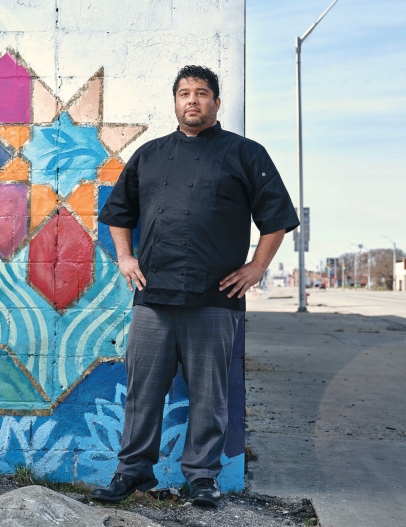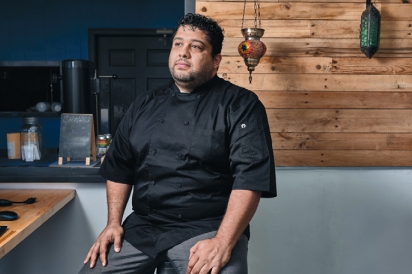In the Kitchen
Omar Anani
He transformed Saffron De Twah from a tasty Moroccan bistro into a community kitchen
For Chef Omar Anani, 2020 was one “constant pivot after pivot after pivot after pivot.”
In March, he shuttered his James Beard Award—nominated restaurant Saffron De Twah after bringing in only $80 revenue on a Tuesday that would have normally netted $1,500.
The Gratiot Avenue restaurant, featuring Moroccan cuisine with artful tweaks to make it more accessible to the American palate, had become something of a sensation in the months prior to the pandemic. The response was a dream come true for Anani, who had been considering leaving the food business altogether. So, having to suddenly shut down was a blow.
But sitting amid the piles of food that he now had no use for, and facing his employees who were now out of a job, Anani channeled his great-great-grandfather, who was known for his generosity in Egypt and Palestine. He recalled stories of how he had lived his life with only two articles of clothing—one that he wore and another to wash, so that he wasn’t taking up too much—and how he made sure that leaders were distributing the zakat, a tithe paid by Muslims, adequately to those in need.
“Most of my decisions here at Saffron have not been money motivated, they’ve just been ‘Hey, let’s do the right thing—and if it monetarily works out, great. And if it doesn’t, it’s not a big deal,’” says Anani. “And that’s not a smart way to do business at all, if you ask anyone, but it’s been the method of how I run this restaurant.”
Anani’s first pivot was to feed his own workers, then other restaurant workers in the community. Slowly, he began feeding the wider community in collaboration with grassroots efforts, delivering meals to hospital workers and sending a food truck into Detroit’s Fitzgerald neighborhood. By July, Saffron De Twah had become Saffron Community Kitchen, a hub for preparing and distributing meals to feed those in need. At its peak, it was preparing and delivering 1,400 meals per day.
In January, Anani pivoted yet again, this time to subscription meal boxes. Each box also pays for a meal to feed those in need. The concept allowed Anani to generate some revenue to keep the lights on while continuing to serve the community.
“It opened my eyes to where I want to take Saffron Community Kitchen and turn it into something permanent, and not [just] something that we did during the pandemic,” he said. “Because if something happens in the city again, we want to be able to mobilize and support and help.”
With the pandemic’s end in sight, Anani is turning his attention back to Saffron De Twah as a restaurant—but with a continued intention to be of service to the community.
He’s proud to be one of the only food establishments in the region offering Moroccan flavors to those who have never tried them before, melding the sweet and savory: Think chicken with apricot and honey; fresh green salad with yogurt sauce; lamb and vegetables flavored with chermoula (a Moroccan rub mixing coriander, cumin and chiles) atop couscous or semolina grits.
“It’s one of the oldest cuisines in the world—it predates anything that Europeans started,” says Anani. “I’m a French-trained chef, and Moroccan allows me to use the food of my people—because I’m half- Egyptian half-Palestinian, right? This allows me to show people that mix of culture and mix of foods and techniques on a plate.”
Learn more at saffrondetwah.com.






